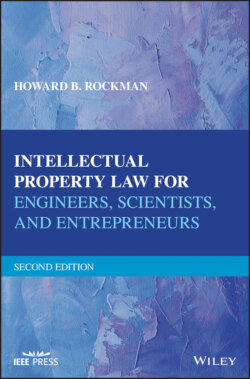Читать книгу Intellectual Property Law for Engineers, Scientists, and Entrepreneurs - Howard B. Rockman - Страница 69
3.7 THE U.S. GOVERNMENT’S RIGHT TO PRACTICE YOUR PATENTED INVENTION
ОглавлениеDuring World War I, the U.S. government mobilized the nation’s industries to provide munitions and other materials to support the war effort. This program ran into several barriers when patent owners filed patent infringement lawsuits against government contractors, and obtained injunctions stopping the production of needed weaponry, among other military necessities. To correct this situation, the Congress, circa 1918, passed a law that is now codified at 28 U.S.C. §1498. This law provides that, whenever a manufacturer is using or manufacturing an invention described in a U.S. patent for the government and with the authorization and consent of the government, the patent owner cannot bring a patent infringement suit against the infringing user or manufacturer. The patent owner’s only remedy is to file a patent infringement action against the government in the Court of Federal Claims, and the patent owner can only recover “reasonable and entire compensation for such use and manufacture” (28 U.S.C. §1498(a)). The patent owner cannot obtain an injunction stopping the use or production of the patented invention when the government is the ultimate customer.
Under this law, which is still in effect today, the government, by authorizing and consenting to have a patented process used, or a product manufactured, on its behalf, is effectively taking a license under the patent under the powers of eminent domain, whether or not the patent owner wants to grant the government a license. This procedure is akin to the government’s ability to condemn and take private property to construct a highway, for example. When such “taking” occurs, the one whose property, or patent right, has been taken is entitled to be reasonably and entirely compensated, with money, for such taking.
If you discover that the U.S. government has awarded a contract to a competitor who underbid you, and you hold a patent on the subject of the contract, you cannot sue your competitor for patent infringement. You must file your lawsuit against the government in the Court of Federal Claims, and the government lawyers of the U.S. Department of Justice will respond to your lawsuit, usually raising defenses of non‐infringement, patent invalidity, unenforceability of the patent, plus any other of the many defenses to patent infringement that are available. If your competitor, who is the selected government contractor, has agreed in the contract to indemnify or hold the government harmless from patent infringement, the Justice Department attorneys may be accompanied by your competitor’s attorneys in defending against your lawsuit. At the end of the lawsuit, if you prevail, you are awarded your “reasonable and entire compensation” as determined by the Court, which usually is based on a reasonable royalty payment for the infringing sales. However, you will not be awarded an injunction stopping the government from obtaining infringing products from your competitor.
If you discover that the U.S. government has awarded your competitor a contract for the use or manufacture of an invention on which you hold a U.S. patent, my advice is that you contact your patent professional to make a determination regarding the viability of asserting your patent against the government. Remember that, since the U.S. government can obtain a license under any U.S. patent, the contract award can be made to the lowest bidder, regardless of who owns the patent on the subject invention.
Additionally, the same or similar provisions apply to the U.S. government taking a copyrighted work (28 U.S.C. §1498(b)), a patented plant variety (28 U.S.C. §1498(d)), or a mask work or vessel hull design (28 U.S.C. §1498(e)).
